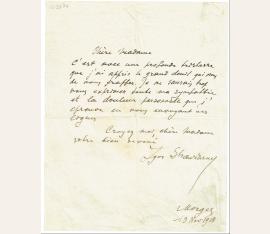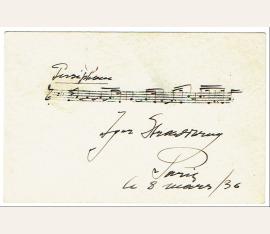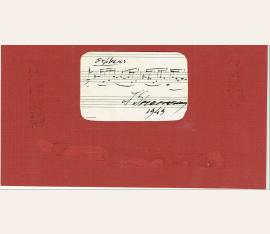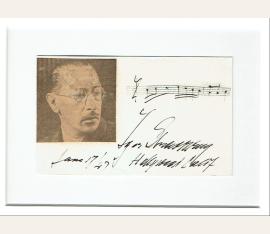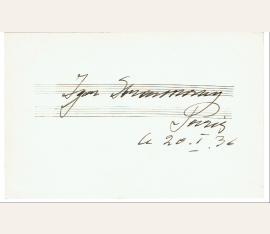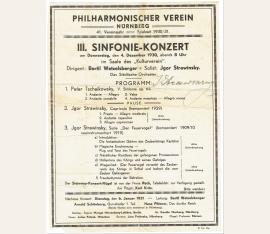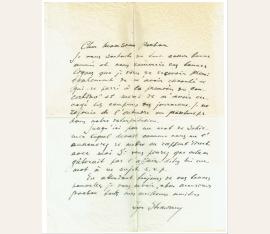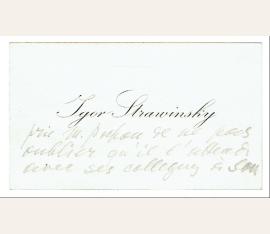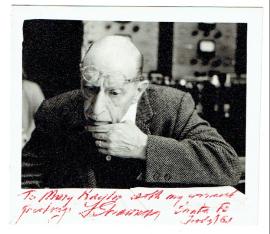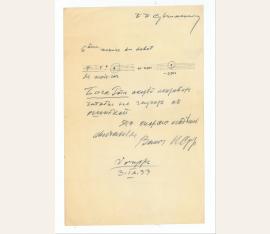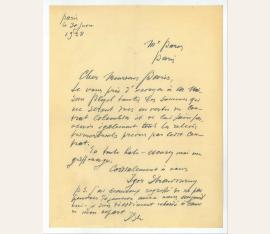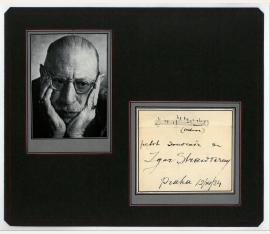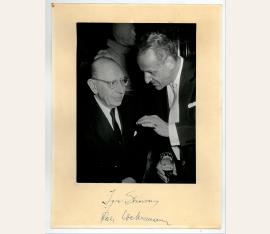russ. Komponist (1882-1971). Autograph letter signed. Morges. 4to. 1 page.
$ 3,738 / 3.500 €
(62448)
A letter of condolence to one „Chère Madame“: „C'est avec une profonde tristesse que j'ai appris le grand deuil qui vient de vous frapper. Je ne saurais trop vous exprimer toute ma sympathie et la douleur personelle que j'eprouve en vous envoyant ces lignes.“
russischer Komponist und Dirigent mit französischer und amerikanischer Staatsbürgerschaft (1882-1971). Eigenh. musikalisches Albumblatt mit Unterschrift. Paris. Quer-kl.-8vo. 1 p.
$ 4,806 / 4.500 €
(81433)
Drei Takte aus seinem 1934 entstandenen Tanzmelodram „Perséphone“ auf eigenhändig gezogenen Notenlinien. Sehr selten. Autograph Musical Quotation Signed, three bars from Perséphone, notated on a handdrawn stave, with holograph title.
russischer Komponist und Dirigent mit französischer und US-amerikanischer Staatsbürgerschaft (1882-1971). Eigenhändiges musikalisches Albumblatt mit Unterschrift. ohne Ort. Quer-kl.-8vo. Notenpapier. Der Ausschnitt montiert auf rötliches Passepartout.
$ 3,738 / 3.500 €
(81796)
Drei Takte aus seinem Ballet Orpheus. - Zusammen mit einem unsignierten Portrait (8vo.). Orpheus ist ein 30-minütiges neoklassizistisches Ballett in drei Tableaus, das Igor Strawinsky 1947 in Zusammenarbeit mit dem Choreografen George Balanchine in Hollywood, Kalifornien, komponierte. Das Werk wurde von der Ballet Society in Auftrag gegeben, die Balanchine zusammen mit Lincoln Kirstein gründete und deren Künstler Direktor er war. Sets und Kostüme wurden von Isamu Noguchi erstellt.
russischer Komponist und Dirigent mit französischer und US-amerikanischer Staatsbürgerschaft (1882-1971). Eigenh. musikalisches Albumblatt mit Unterschrift. Hollywood. Quer-8vo. 1 p.
$ 3,738 / 3.500 €
(81980)
Eigenhändiges musikalisches Albumblatt auf Briefkarte mit Portraitdruck. Drei Takte von Strawinskys Hand ohne Textunterlegung oder Werkbezeichnung. Igor Fjodorowitsch Strawinski war ein Schüler von Nikolai Rimski-Korsakow bildete sich aber ansonsten weitgehend autodidaktisch aus. Strawinsky steht für ein große Stilvielfalt und eine intensive Auseinandersetzung mit den technischen und stilistischen Entwicklungen der Musik seiner Zeit. Über seine Musik sagte er, sie sei „unfähig, irgendetwas auszudrücken“.
In seinem Spätwerk wandte Strawinsky sich auch der Zwölftontechnik und dem seriellen Komponieren zu. Neben Schönberg gilt Strawinsky als der einflussreichste Komponist des 20. Jahrhunderts..
russischer Komponist und Dirigent mit französischer und US-amerikanischer Staatsbürgerschaft (1882-1971). Eigenhändige Unterschrift in einer gedruckten Notenzeile. Paris. Quer-8vo. 1 p.
$ 1,015 / 950 €
(86938)
Als hübsches Sammlerstück geschriebener Namenszug in einer Notenzeile. Aus der Sammlung des Wiener Anwalts Max Bettelheim (1912-1971). Von dessen Nachfahren übernommen.
russischer Komponist und Dirigent mit französischer und US-amerikanischer Staatsbürgerschaft (1882-1971). Eigenh. Unterschrift auf Konzertprogramm. Nürnberg. 4to. 1 p. Faltspuren. Gebräunt. Leichter Einriss am unteren Rand. Faltenbrüche alt restauriert.
$ 1,281 / 1.200 €
(89408)
Beim III. Sinfonie-KOnzert im Salles des Kulturverein Nürnberg traten Bertil Wetzelsberger als Dirigent und Igor Strawinsky als Solist auf. Gespielt wurden Peter Tschaikowskys V. Sinfonie op. 64, Igor Strawinskys Capriccio von 1929 und Strawinskys Sutie „Der Feuervogel“.
Russian (and later French and American) composer, pianist, and conductor (1882-1971). Important archive of 6 autograph letters signed and 3 autograph postcards signed. Morges, Garches, Biarritz. Gr.-4to. und 8vo. 12 pp.
$ 24,028 / 22.500 €
(91899)
Important correspondence with Alfred Pochon (1878-1959), a Swiss violinist and member of the New York-based Flonzaley Quartet, concerning the first performance of Strawinsky's Three Pieces for String Quartet, K19 in 1915 and the commission, composition, and premiere of his Concertino for String Quartet, K35 between 1919 and 1922. The earliest postcard of the correspondence from 29. Mai 1915 is an invitation for dinner in Strawinsky's house in Morges. Strawinsky asks Pochon to bring the sheet music of the string quartet so that they can look at it together.
This was only weeks after the not very successful premiere of the composition in Paris on 13 or 19 May 1915 by an ensemble surrounding Darius Milhaud. Pochon's Flonzaley Quartet first performed the composition on 8 November 1915 in Chicago, a few months after the proposed meeting. On 25 January 1917, Strawinsky wrote another postcard from Morges, asking Pochon to give "all of the material (sheet music for the ensemble and parts)" to Edward Bernays, his representative in America. Strawinsky thought "that this affair had been settled for a long time" and thanks Pochon for "taking care of the numerous proofs" of his quartet. Before 1918, the sheet music for the Three Pieces for String Quartet only circulated in manuscript-form. Although Strawinsky considered dedicating the second piece to Pochon, who had originally suggested the composition to him, he ultimately decided against it. Strawinsky's connection to the journalist, press agent, and theorist Edward Bernays (1891-1995), who is considered to be the father of public relations, was previously unknown. He certainly knew Bernays through Sergei Diaghilev who had hired Bernays as a press agent for his Ballets Russes on their American tours. - The larger part of the correspondence, stretching from 1919-22, concerns the Concertino for String Quartet that was commissioned by Alfred Pochon on behalf of the Flonzaley Quartet in a letter dated 17 August 1919. On 1 September 1919, Strawinsky responded to the request, accepting an offer of 500$ for "composing something" for the quartet and the exclusive performance rights for the United States for at least 1 year or until the publication. The piece should be dedicated to the musicians of the quartet and the American banker and collector André de Coppet. Strawinsky also gives condolences for the death of Pochon's infant son and thanks him for his "interest in the difficult situation" that him and his family found themselves in, "thanks to the war and the revolution" in Russia. In a curious remark, Strawinsky stresses that he has "always considered the exchange of musical production (like any other production) for money to be an entirely natural thing", thus explaining the "somewhat 'business-like' character" of his letter. - Over four months went by until Strawinsky responded to a letter from 14 October 1919 with apologies for his "long silence" and the reaffirmation of his "promise to compose a piece [une musique]" for Pochon's "marvelous ensemble", reassuring him: "Not only do I constantly think about it but I'm also, from time to time, accumulating material, bringing to paper some things that come to me 'through the ears', 'through the fingers', through the head". What he lacked was time but he announces to work on the composition during the summer. Strawinsky then addresses a "somewhat delicate subject", asking Pochon to pay the agreed-upon sum already, given his difficult financial situation following the Russian revolution: "I'm the only support not only of my own family but also of that of my sister who came here without any means of subsistence and of relatives that are very close to me and my wife who come from Russia one after the other [...]". In a short postscript, he agrees to extend the performance rights for the composition to all countries. (Morges, 25.02.1919). - On 3 May 1920, Strawinsky announces the reception of the sum and his plans to move to Italy, first Positano and then Rome, in order to safe expenses. He also mentions his departure to Paris for the premiere of Pulcinella by the Ballets Russes at the Paris Opera and invites Ponchon to visit him in Positano, where he plans to work on the quartet. - While the plans to move to Italy never materialized, Strawinsky did start the composition in the late summer of 1920. On 16 September 1920, he wrote a postcard from Coco Chanel's villa in Garches near Paris to schedule a meeting in Paris. Strawinsky explains: "I'm living temporarily in the house of a friend who offered her villa to me until I find accommodation, which is very difficult here". In two short postscripts he adds: "My children thank you in any case for the post stamps, the craze of which has not yet ebbed for them" and, more importantly: "The composition of the quartet is in full swing [bat son plein]". - Strawinsky completed the piece on 24 September and it was first performed on 3 November 1920 by the Flonzaley Quartet in New York. Strawinsky's first letter following the premiere didn't touch upon it, rather discussing a potential publication deal with the New York based publisher G. Schirmer. It seems that Schirmer's "new proposition" didn't include the Concertino, considering Strawinsky's somewhat cryptic remark: "I expected the answer with respect to the Concertino", which is also the first time that the title Concertino appears in the correspondence. Strawinsky does, however, accept an alternative deal with the demand of three changes to the contract: "I. I will gladly compose 3 small pieces for piano but without guarantee that they will be based on 'Russian folk-lore', I cannot do such a thing on command. - II. Instead of 5 little pieces for voice and piano, I propose to him to compose the same number of small pieces for flute and piano or violin and piano or flute and violin or two violins (something that I have wanted to do for a long time). - III. For the payment (for the 10 small pieces) of a thousand dollars [...]". Although Schirmer did publish some of Strawinsky's compositions, the deal in question never materialized. The Concertino would be published in Copenhagen in the Edition Wilhelm Hansen in 1923 with the dedication to the Flonzaley Quartet. - The only undated letter of the correspondence must be dated to January 1920 as Strawinsky mentions the premiere of the Concertino and sends his New Year's Wishes to Pochon. He thanks him for an account of the premiere and newspaper clippings of reviews, expressing his joy that he will "hear it in spring in your interpretation". In closing, Strawinsky asks Pochon to bring up the deal with Schirmer that is, if he thinks that it "won't ruin the affair". - The final letter, written from Biarritz on 9 February 1922, concerns a European tour of the Flonzaley Quartet with the Concertino. Strawinsky thanks Pochon for more clippings and expresses his regret to have missed a concert in Paris in autumn that people "have later talked about with a lot of enthusiasm". He answers a question concerning tonality: "I use the F natural ([natural sign]) in the 4th beat in the bar before no. 22 - it is indeed an F natural ([natural sign]) in the 1st and 2nd violin that I forgot to mark with a ([natural sign]) and announces to send a copy of his Three Pieces for String Quartet to Pochon. In closing, he asks his correspondent an interesting favor: "When you come to Paris, could you bring me the sheet music for orchestra of my ballet 'L'Oiseau de feu' (the only printed sheet music that exists outside of Russia). This sheet music is with Mrs. Marie Brooks [...], New York. I wrote to this Madam [...] and never got a response. If it doesn't inconvenience you too much, you would do me an immense favor!"..
Russian (and later French and American) composer, pianist, and conductor (1882-1971). Visiting card with holograph addition. Garches. Oblong-32mo. 2 pp. Pencil.
$ 1,281 / 1.200 €
(91900)
Addressed to Alfred Pochon (1878-1959), a Swiss violinist and member of the New York-based Flonzaley Quartet, concerning the first performance of Strawinsky's Three Pieces for String Quartet, K19 in 1915 and the commission, composition, and premiere of his Concertino for String Quartet, K35 between 1919 and 1922. „IGOR STRAWINSKY prie M. Pochon de ne pas oublier qu’il l’attend avec ses collegues à son attelier (22, rue Roche chouard) à 9 heurs du soire pas plus tard car à 10 1/2 il doit prendre le train pour rentrer à Garches“.
Komponist (1882-1971). Photograph signed and inscribed. Santa Fe. 85 : 75 mm. Kleberückstände auf der Rückseite.
$ 1,068 / 1.000 €
(92934)
Nice head and shoulders photograph of Strawinsky. Signed in red ink below the image, showing the composer perusing a musical score.
Russian, and later French and American, composer, pianist, and conductor (1882-1971). Autograph letter signed "IStr". Voreppe. 03.09.1933. 8vo. 1 p. on bifolium. In pencil.
$ 3,738 / 3.500 €
(82515/BN53640)
To his friend, the patron, music critic, and tenor Pyotr Suvchinsky (1892-1985), correcting a note in the score of "Perséphone". As Stravinsky demonstrates with the help of two short musical notations of the "6th measure of the beginning", the last syllable of the word "mois-son" (crops) was to be sung in B and not in a higher D. The notations with French captions are followed by a short explanation in Russian, starting with the exclamation "For God's sake". - Stravinsky had invited his friend and fellow expatriate Suvchinsky to sing the part of Eumolphe in the production of the theatrical ballet "Perséphone".
In a letter from 23 July 1933 Suvchinsky wrote to thank Stravinsky: "Your promise [of the part in "Perséphone"] is the first gift that I have received in Paris" (Levitz, p. 321). Nevertheless, the role was created by René Maison at the premiere at the Paris Opera on 30 April 1934. - "Perséphone" was a collaboration between Igor Stravinsky and the Nobel laureate André Gide. The famous dancer Ida Rubinstein had initiated the project in 1933 and later danced the lead role. For the libretto Gide revised a sketch from 1912, but the collaboration proved difficult, as Stravinsky took liberties in adapting the text to his musical vision. Ahead of the premiere, Gide distanced himself from the project, as he was dissatisfied with Jacques Copeau's staging and Kurt Jooss's choreography. Only much later did Gide acknowledge the quality of Stravinsky's composition. - Well preserved..
Russian, and later French and American, composer, pianist, and conductor (1882-1971). Autograph manuscript signed. Paris. 4to. 1 page, watermarked 'Victory Extra Strong'. Written in pencil.
$ 4,806 / 4.500 €
(88560/BN58451)
A note for a hasty departure and a missed luncheon, addressed to "Monsieur Paris" and signed by Strawinsky. Strawinsky writes to ask that matters of sums and business be sent "à la Maison Pleyel". Somewhat unusually, while in Paris Strawinsky earned extra income by writing arrangements for the piano design company Pleyel, and was particularly interested in their player pianos. To his recipient, Strawinsky apologizes, "excusez moi mon griffonage" and concludes, "P.S. J'ai beaucoup regretté que ne pas pouvoir déjeuner avec vous aujourdhui", ending with a second abbreviated signature. - Gently creased along folds.
Russian (and later French and American) composer, pianist, and conductor (1882-1971). Autograph musical quotation signed. Prague. Oblong small 8vo. 1 page.
$ 5,873 / 5.500 €
(90240/BN59711)
Three bars of his "Octuor for Wind Instruments" as a "petit souvenir de Igor Strawinsky". - Mounted.
Komponist (1882-1971). Portraitphotographie mit eigenh. U. Wohl Hamburg. 230:170 mm auf Untersatzkarton.
$ 1,335 / 1.250 €
(92700/BN62033)
Hübsches S/W-Portrait von Strawinsky und Rolf Liebermann im Gespräch. Entstanden ist die Aufnahme wohl anlässlich der Feierlichkeiten zu Strawinskys 80. Geburtstag, den der Komponist auf Einladung des Schweizer Komponisten und Intendanten Rolf Liebermann am 5 Juni 1962 in Hamburg begangen hatte. - Der Untersatzkarton minimal unfrisch und mit kleiner Montagespur verso; die Unterschriften von Strawinsky und Liebermann unterhalb der Aufnahme am Karton.

russischer Komponist und Dirigent mit französischer und US-amerikanischer Staatsbürgerschaft (1882-1971). Eigenh. Widmung, Datierung und Unterschrift in: Erinnerungen an Igor Strawinsky. C. F. Ramuz. Hamburg. 8vo. 131 pp. Suhrkamp Verlag. Erste bis vierte Auflage.
$ 908 / 850 €
(89254)
Auf der Titelseite mit Unterschrift von Strawinsky: „To Mr. Klaus Wichman sincerely I Strawinsky“.
